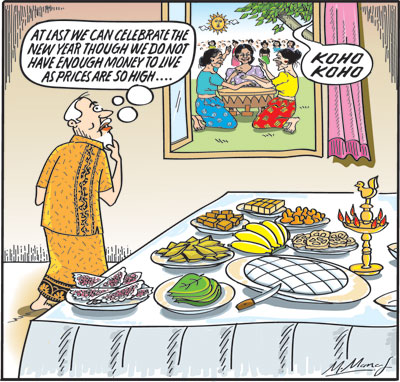Columns
Celebrating the New Year amidst economic hardships and deprivations
View(s):The National New Year was celebrated this year in the traditional manner of observing nekath, or auspicious times, making kiribath and sweetmeats, and raban playing. From urban areas, workers returned to their villages and united with their families, relatives, and neighbours. It is a festive holiday season when the economy comes to a near halt.
This year
This year’s New Year celebration came amidst economic conditions that were undoubtedly better than the previous years of shortages of essentials, though living expenses have soared and livelihoods are difficult for a high proportion of people. Nevertheless, there was an air of festivity and cheer.
Availability
Essentials like food, fuel, and other necessities are freely available. The economy that has been contracting has turned around and grown at 1.5 percent in the last quarter of 2023. This year’s growth is expected to be about 4.5 percent. Yet, the turnaround to growth has not benefited the poor. Poverty and deprivation are widespread in rural areas and among the urban poor. Nevertheless, they also celebrated the New Year.
No indication
These celebrations are no indication of economic conditions. Somehow, whatever the economic plight of the poor, they celebrate the New Year. And this year’s New Year celebration was better than in recent years.
Improvement
Doubtless, this year has seen an improvement in living conditions, though poverty and malnutrition have increased due to the soaring prices of basic foods and essentials. No longer are there acute shortages of essentials. However, prices have risen sharply, unemployment is high, and health facilities have deteriorated.
Poverty
Recent estimates found that about 9 million people are in poverty and that around 40 percent of children are malnourished. Many households do not have the means to feed the family adequately. Consequently, malnourishment has increased. This is a startling revelation.
Inequality
Undoubtedly, inequality has increased. Although there are no recent estimates of income distribution (Gini coefficient), the fairly high inequality for many years may have worsened. This is especially due to the poor becoming poorer.
Interventions
In recognition of this, the government has re-introduced a morning meal for schoolchildren. The Aswesuma programme of poor relief is expected to ameliorate the living conditions of the poor. However, in the past, during the Janasaviya and Samurdhi programmes, many of the deserving poor did not receive the benefits, while the not-so-poor did. Let us hope that the newly designed programme is better targeted.
The rich
In contrast, the affluent are wining and dining at expensive restaurants and hotels and travelling to all parts of the country. There is not only a tourist boom; there is also a holiday rush among Sri Lankans to resorts in Kandy, Nuwara Eliya, Mannar, Kalpitiya, Galle, the east coast and other places. There has also been an increase in travel abroad and expats holidaying in the country. This phenomenon was visible at Christmas and long weekends as well.
Disparity
This extravagant expenditure amidst growing poverty and deprivation is indicative of the wide disparity in incomes in the country. The affluent are thriving, while the poor are suffering.
Assistance
International organisations, foreign governments, religious institutions, and charitable organisations are providing food to the poor. These are very helpful in alleviating hunger, but inadequate.
Paradox
These conditions of poverty and deprivation are difficult to understand when witnessing the shopping crowds, travel, and festivities in the country. Is this paradox due to the wide disparities in income, or are there other reasons?
Workers remittances
Are worker remittances an explanation for this? Over one-half of the remittances are from workers in Arab countries, South Korea, Japan, Malaysia, and some European countries. A high proportion of these worker remittances flow into poor households. Besides the remittances that come through official channels, there is a significant amount sent through informal sources. There is no estimate of these. Are these foreign remittances alleviating poverty significantly? Despite this factor explaining the lessening of poverty, there is no doubt that it has increased.
Celebration
The New Year celebration, as in the past, is not an indicator of the state of the economy. Maybe poor households pawn their jewellery or borrow money. Maybe relatives, friends, and neighbours assist the poor at this time.
Alleviating poverty
There is much to be done to alleviate poverty and build a more equitable society. Economic growth is certainly a prerequisite, though insufficient. Economic policies should ensure progressive taxation and low inflation. Government interventions, too, are dependent on the growth of the economy and increased revenue. Government intervention should be better targeted and devoid of political motives.
Conclusion
No doubt the greeting of people for the new year—Subha Aluth Avuruddak—would be a reality to most people only if the economy’s growth accelerates and there is lower inflation and higher employment. This year’s wish of Subha Aluth Avurddak will be a reality only if the economy grows rapidly, there is lower inflation, and the benefits of growth result in more inclusive development.
Buying or selling electronics has never been easier with the help of Hitad.lk! We, at Hitad.lk, hear your needs and endeavour to provide you with the perfect listings of electronics; because we have listings for nearly anything! Search for your favourite electronic items for sale on Hitad.lk today!


Leave a Reply
Post Comment